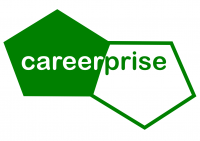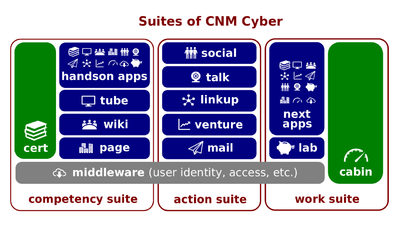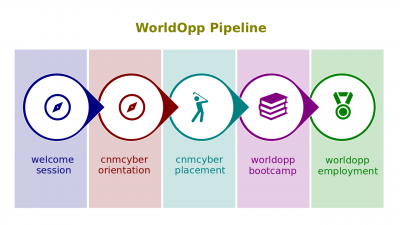Job Market Essentials
The Job Marketing Tools (hereinafter, the Lesson) is the lesson of CNM Cyber that introduces its participants to CNM Cyber Orientation. The Lesson belongs to the Introduction to Careers session of the CNM Cyber Orientation.
The Lesson is made up of three lectios. At CNM Cyber, the word, lectio, is used for a lesson part.
Contents
Summaries
Predecessor
- The predecessor lesson is Employment Credentials.
Outline
Directories of Credentials Lectios # Referred topics Summaries of Qualifications 1 Professional Portfolios 2
Successor
- The successor lesson is Workforce Service Providers.
See also

Directories of Credentials is the fifth lectio (or lesson part) in the Introduction to Careers lesson. The lesson itself is the fourth in CNM Cyber Orientation. Consequently, the Orientation is the first stage of WorldOpp Pipeline.
This wikipage presents its full script and those test questions that are related to that lectio.
Directories of Credentials
- Main wikipage: Directories of Credentials; video (0:00)
- Directory of credentials. A document that lists one's credentials, most commonly, applicable to particular employment and is usually designed to help the reader, such as a recruiter, hiring manager, customer, or any other targeted stakeholder, of the directory to navigate them.
- Résumé. Any document that a person uses to present his or her achievements and capacities. In the industry of workforce services, a résumé usually presents credentials applicable to particular employment.
- Professional bio. A descriptive account of a person's professional history.
- Elevator pitch (elevator speech, elevator statement). A short description of an idea, product, business, or individual that explains the concept and/or value in a way such that any listener can understand it in short time.
- List of professional recognitions. A general list of recognitions composed for unspecified references or a list of select ones for a particular employment.
- List of educational credentials. A list of all educational credentials composed for general references or select ones for a particular employment.
- List of worked projects. A list of all projects that one has worked on composed for general references or select ones for a particular employment.
- List of key accomplishments. A general list of accomplishments or a list of select accomplishments for a particular employment.
- Professional portfolio. An organized presentation of those individual's credentials that demonstrate his or her professional achievements and capacities. The portfolios may contain educational credentials, work samples, and other employment credentials offered by a professional and/or employment candidate especially when considered for being hired.
- Working portfolio. Any professional portfolio that consists of works in progress. When those works are finished, they may be moved to more permanent assessment and/or display portfolios.
- Showcase portfolio. Any professional portfolio that is any collection of credentials that are both demonstrations of one's abilities and platforms for self-expression.
- Electronic portfolio (eportfolio, e-portfolio, digital portfolio, or online portfolio) is a showcase portfolio accomplished in a digital form. The credentials may include input text, electronic files, images, multimedia, blog entries, and hyperlinks.
- Credentialing portfolio. Any professional portfolio that provides its viewer with one's credentials.
Script
The video of the presentation is published at https://youtu.be/BktQFe9j0Jk (10:00). Here is its full text.
Overview
- Welcome to Directories of Credentials. In this brief presentation, we are going to take a look at what may qualify one for working in a particular occupation and/or in particular industry. Let's start-off.
Resumes
- Because of many credentials, many employers are looking for some directory of credentials, the most popular directory is resume. This is any document a person uses to present his/her achievements and capacities in the industry of work force services. Resume usually presents credentials applicable to a particular employment. Here, I need to say that your resume is not a story of your life. It is basically a summary of what you did in your previous life. Your credentials but only those credentials which are applicable to an employment which you are looking for.
Bios
- Another example it could be a professional bio, it`s a descriptive account of a person`s professional history, it could be a list of professional recognitions, or education credentials. It could be a list of worked projects, list of key accomplishments. Once again, every of these directories can be both. It can list everything you have, maybe for your own reference like a master resume or a master bio. At the same time, it could be more specified to your employment where for instance from the list of all your professional recognitions or all worked projects you just choose those which are applicable to a particular employment which you are looking for.
Portfolios
- Professional portfolios is organized presentations of those individual credentials that demonstrate his/her professional achievements and capacities and usually professional portfolios are created for some particular job so someone can take or keep this portfolio just in case put in all the works but for a particular employment it, it makes sense to create specialized portfolio. Especially if this employment is very new because working with portfolios takes time and effort and technically time is money so it can be expensive too.
- There are many types of portfolios, for instance working portfolio is the portfolio of work which you already are doing, for me, my working portfolio is wiki side. If someone asks me what I am doing right now, I will direct them to the wiki pages and view my contributions.
- Another type of portfolio is showcase and usually it`s good in both demonstration of ones` abilities and a platform for self-expression. Designers very often use showcase portfolio. An electronic or digital form of showcase portfolio is called electronic portfolio or e-portfolio, digital portfolio, line portfolio. You can name them.
- Credential portfolio. This is a more strict type of portfolio. It provides it`s viewers with ones’ credentials in one place. So if someone say`s in your resume I have this certificate or this diploma, someone can go there and take a look at this with the details for this certificate. Credential, some credentials are self-declared, some credentials are discovered during their screening, so let`s say your good performance at the interview can be a credential itself and this is assessed by your employer. But in some cases third party credentials come into the play. Third party credentials are credentials issued by a third party, not your employer but someone else. Some of them are government regulator, employment organizations, or work permit or criminal records. For some jobs, criminal records are very important.
Summary
- This concludes the Directories of Credentials presentation. We have defined employment credentials and taken a look at some of them including self-declared credentials and third-party credentials. Special considerations were given to professional credentials such as professional licenses, trade certificates, work experiences, work sample tests, and others. Quick stops were made by directories of credentials such as résumés, professional bios, and portfolios. If you haven't done yet so, you are now welcome to move to Workforce Service Providers.
Quiz questions
- Every statement below is split into one true and one false question in the actual exam.
"Resume" questions
- Résumé is (not) an example of directory of credentials.
"Bio" questions
- Professional bio is (not) an example of directory of credentials.
"Lists" questions
- List of professional recognitions is (not) an example of directory of credentials.
- List of educational credentials is (not) an example of directory of credentials.
- List of worked projects is (not) an example of directory of credentials.
- List of key accomplishments is (not) an example of directory of credentials.
"Portfolio" questions
- Professional portfolio is (not) a qualification, achievement, personal quality, aspect, or document relevant to a particular job.
- Professional portfolio is (not) a credential that hasn't been verified yet or cannot be verified.
- Professional portfolio is (not) a product of one's performance intended to show his or her capacity.
- Professional portfolio is (not) a range of work samples and/or other employment credentials.
- Professional portfolio is (not) a credential issued by a third party.
- Professional portfolio is (not) the experience of working in a specific field or occupation.
- Professional portfolio is (not) a sample of behavior that can be used to predict future performance in similar work situations.
- Professional portfolio is (not) a suggestion or proposal to hire somebody because of his or her professional capacity.
- Professional portfolio is (not) an observation and/or evaluation of professional performance made by a customer.
See also
- Workforce Service Providers. The last presentation in Introduction to Careers.
- Employment Credentials. The fourth presentation in Introduction to Careers.

